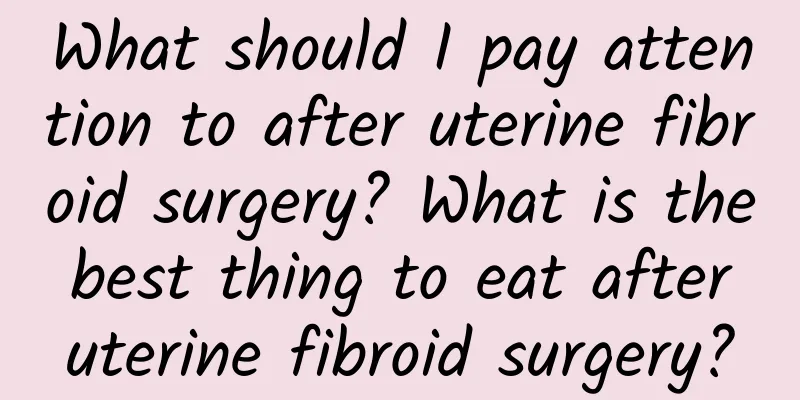What should I pay attention to after uterine fibroid surgery? What is the best thing to eat after uterine fibroid surgery?

|
This sentence should be used for human health issues. If you have uterine fibroids, it is essential to go to the hospital for examination and treatment. Knowing some basic knowledge can be well understood. Talk with medical experts and many women with uterine fibroids to find the right treatment for uterine fibroids, advocate the concept of prevention and auxiliary treatment, and talk about uterine fibroid health care: precautions after uterine fibroid surgery. Precautions after uterine fibroid surgery 1. Nursing methods after uterine fibroid surgery encourage more turning over or bedside activities to promote the discharge of gas in the body and prevent flatulence. Keep the wound clean and dry. If there is exudate, notify the nursing staff immediately to change the gauze. If you feel any pain in the wound, tell the nurse and they can give you painkillers as prescribed by the doctor. After the gas is discharged, you can eat a light diet, such as white porridge, green vegetables, etc. Do not eat gas-producing foods to prevent bloating, such as milk, beans, etc. The urinary catheter can be removed on the second day after surgery, and the patient can urinate on his own within 5 hours. It is recommended to eat high-protein, high-iron, and high-fiber foods such as cherries, grapes, fish soup, and vegetables after exhausting gas to prevent constipation and promote wound healing. Abdominal pressure should be avoided when getting out of bed, such as bending over, squatting, climbing stairs, riding a bicycle, etc. Wipe from front to back after using the toilet to avoid infection. Precautions after uterine fibroid surgery 2. Home care and precautions after uterine fibroid surgery. There will be no menstruation for 6-8 weeks after hysterectomy surgery. If the deep tissue in the pelvis recovers, you can avoid normal sexual life, lifting more than 3 kg, bending over to pick up objects, and climbing stairs within 6-8 weeks after surgery. Belly bands can be used appropriately. Do not sit for long periods of time or travel long distances within one month. Avoid yoga, rhythmic dance and other exercises that can easily increase abdominal pressure to avoid pelvic bleeding. After going to the toilet, wipe from front to back to avoid infection. Observe whether the wound is red, swollen, hot, painful or has abnormal secretions. If you have the above symptoms, please return to the hospital as soon as possible. Eat more fruits, vegetables and high-fiber foods, drink 2000-3000cc of water every day, if you have bilateral oophorectomy to prevent constipation, osteoporosis is prone to occur, and calcium and hormone intake should be increased, such as: animal bones, dried fish, soy foods and appropriate exercise, avoid vaginal douching, take a bath and consume more protein, vitamins and iron foods, such as: fish soup, grapes, cherries, vegetables, etc. There are no special dietary taboos, but try to eat less irritating and gas-producing foods. |
>>: Can I still get pregnant after uterine fibroid surgery? Is uterine fibroid a malignant tumor?
Recommend
What preparations do patients need to make before uterine fibroid surgery?
Surgical treatment of uterine fibroids is a commo...
When can I wash my hair after abortion? How many days after abortion can I wash my hair?
When can I wash my hair after an abortion? This i...
Three major causes of cervicitis
Cervicitis is also one of the most common disease...
What should I pay attention to when my endometrium is thick?
Endometrial thickening has now become a common di...
How is pelvic inflammatory disease caused?
Pelvic inflammatory disease is a common gynecolog...
What are the sequelae of adenomyosis embolization?
After adenomyosis embolization, sequelae such as ...
Can habitual abortion be cured? Doctors say prevention is the key
There are many reasons for spontaneous miscarriag...
What medicine can cure endometrial tuberculosis?
Endometrial tuberculosis is a disease that can af...
Experts will tell you what are the treatments for vulvar leukoplakia?
Vulvar leukoplakia brings great harm and pain to ...
What are the dietary taboos for uterine fibroids? Can uterine fibroids eat spicy food?
Since uterine fibroids are mainly formed by the p...
Don’t just focus on the front when training your core! 360-degree training for your core muscles
As a woman, even though we live in an increasingl...
Proper care for ectopic pregnancy is helpful for recovery
Ectopic pregnancy is a common phenomenon. Women m...
There are four main reasons for cervical erosion
Cervical erosion brings a lot of trouble to our f...
How to treat premature ovarian failure
How to treat premature ovarian failure? Premature...
What is the cause of pelvic inflammatory disease in women?
There is a gynecological disease called pelvic in...









